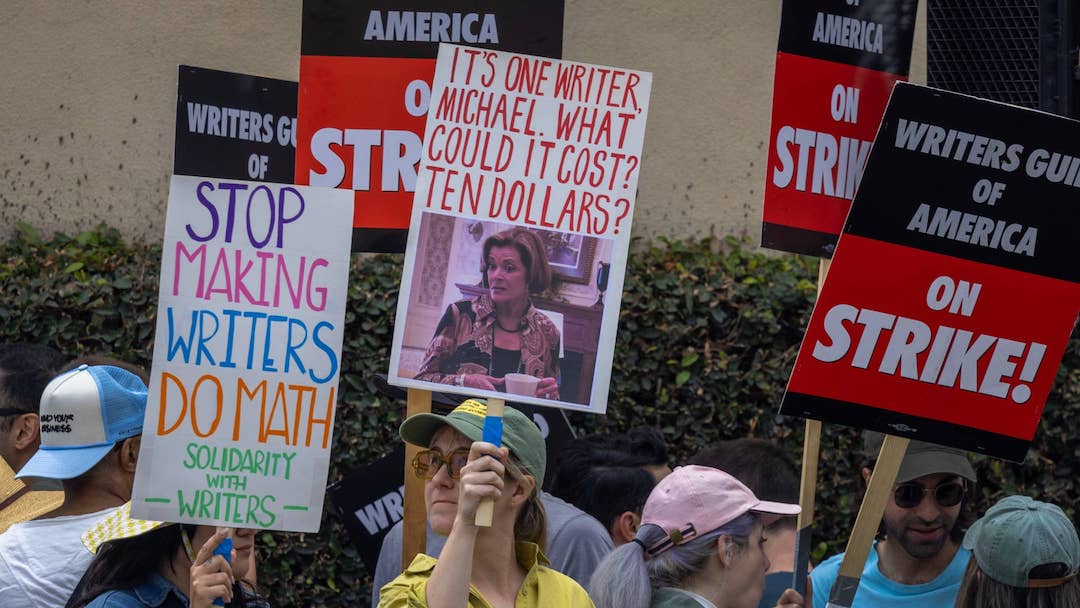
After a breakdown in negotiations with The Alliance of Motion Picture and Television Producers (the group representing Hollywood studios) the three month Writers Guild of America strike took a turn on Thursday when SAG-AFTRA (The Hollywood Screen Actors guild) joined them in taking industrial action. In a rather tangible, visual indication of the start of the strike and the months to come, stars including Matt Damon, Emily Blunt and Florence Pugh left the premiere of Oppenheimer in Leicester Square early with the announcement of the strike impending. So why is this happening, what does it impact and what can we expect to happen?
How did we get here?
The grievances of the WGA and SAG overlap significantly, with the two biggest issues seeming to be residuals from streaming and concerns over the use of Artificial Intelligence (AI) in the industry going forward. Both of these issues are indicative of great changes in the dynamics of Hollywood in recent years. Classically the bulk of one’s residuals would come from television reruns. With the decline of traditional television, and many more eyes going to streaming services such Netflix, Disney+, Amazon Prime etc., the rates for residuals for writers and actors are lower for streaming platforms than TV. The unions, however, are arguing that the change in viewing habits away from traditional television to streaming services requires a change in the current policies, as workers are getting a larger rate for streaming.
AI is also another big point of contention. Hollywood studios have expressed a strong interest in utilising artificial intelligence to write scripts, with human writers being used to simply touch up or expand upon the AI scripts. How this would affect credits and pay offs is unclear. The WGA have demanded an outright ban on the use of AI for writing purposes, with the AMPTP instead saying they will agree to ‘annual meetings to discuss advancements in technology.’ With regard to actors, SAG have alleged that studios are planning on having it so that actors are only brought in for a day’s work and then after capturing their likeness will use AI to complete filming with their characters without even having the actors on set. This would significantly cut their salaries as they essentially would just be getting a day’s pay.
The Impact so far
In the months since the WGA started their strike many projects have been interrupted due to the lack of writers. Marvel Studios have had three movies halted: Spiderman 4, The Thunderbolts and Blade. The long-awaited Community movie has also had filming push back. Similarly, many TV shows such as season 3 of Euphoria, Family Guy season 22, Cobra Kai season 6, The Boys season 4 and The Last of Us season 2 have been put in limbo. The strike’s impact doesn’t just affect fiction TV shows, as several late night talk shows such as The Daily Show, Jimmy Kimmel Live, The Late Show with Stephen Colbert and The Tonight Show starring Jimmy Fallon have also had their weekly broadcasts suspended. One would have to expect further movies and shows to be cancelled or delayed going forward. It should also be noted that the strike is not limited to just acting duties, with union actors not permitted to do press or appear at public events such as premieres.
What does this mean going forward?
Currently all parties (at least when communicating to the public) show no signs of budging and are seemingly prepared for a long standoff. Currently, this is the WGA’s fifth strike, the longest being in 1988 which lasted 153 days. This is SAG’s eighth strike, the longest being in 2000 and lasting 182 days. With regard to SAG joining the WGA, the AMPTP issued a statement saying they were “deeply disappointed that SAG-AFTRA has decided to walk away from negotiations and that contrary to the unions claims the studios had put forward ‘a groundbreaking AI proposal that protects actors’ digital likenesses.”. Disney CEO Bob Iger similarly expressed discontent with the decision to strike saying he found it ‘disturbing’ and not ‘realistic.’
However, as screenwriter Amy Berg says, “It’s so much more than them financially undervaluing us. It’s the slow, brutally intentional devaluation of our creative contributions and labor in general.”
Despite how long it has gone on,the WGA picket lines are still going strong and one can only expect more members of SAG and the public to join them.
Regardless of which side might come out at the end with more claim to victory than the other, one can expect the strike to go on for a while as the industry is further shaken to its core.
Eoin McCambridge is a writer/film enthusiast from Dublin, Ireland. Graduating from the University of Galway in 2022 with a Bachelor of Arts in Film Studies, he has previously contributed articles and film reviews to the university student website. He also has been involved in personal projects for YouTube and operated in various capacities on a number of film sets.














